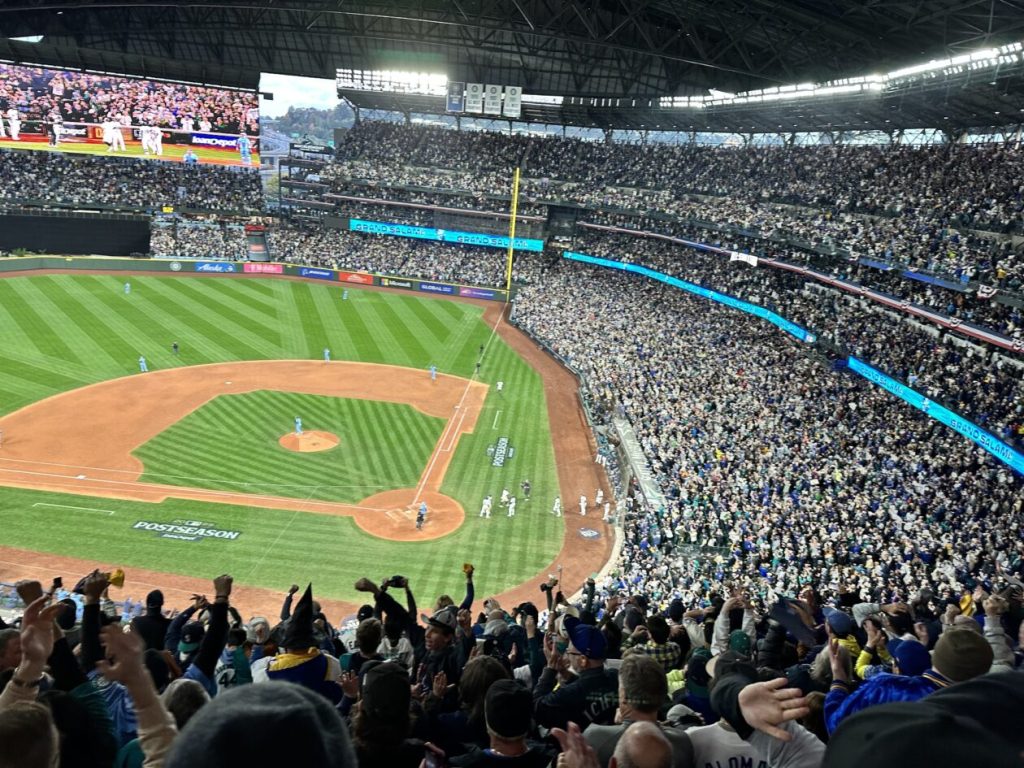MARINERS’ GRAND SLAM SHAKES STADIUM AND HEARTS ALIKE
In a moment that will live forever in Seattle sports lore, Geno Suárez’s eighth-inning grand slam on Friday night didn’t just clear the fences at T-Mobile Park—it literally made the ground shake beneath the feet of 46,000 ecstatic fans. As the ball soared into the night sky, the roar that followed was so powerful that it registered on the Pacific Northwest Seismic Network’s equipment, creating a “baseball earthquake” that perfectly captured the emotional magnitude of the moment. The Mariners’ 6-2 victory over the Toronto Blue Jays pushed them to a 3-2 lead in the American League Championship Series, placing the long-suffering franchise just one win away from their first World Series appearance in team history.
The seismic story began when scientists at the Pacific Northwest Seismic Network (PNSN), inspired by catcher Cal Raleigh’s comments about feeling the stadium vibrate during an earlier playoff game, installed a special sensor inside T-Mobile Park. They playfully named it “Richter Rizzs” after beloved longtime Mariners broadcaster Rick Rizzs, creating a perfect marriage between scientific measurement and baseball fandom. Throughout the game, the device captured the stadium’s vertical ground motion during key moments, including Suárez’s earlier solo home run and Raleigh’s game-tying shot. But nothing compared to the grand slam that sent Seattle into absolute delirium and pushed the needle on the seismograph to unprecedented heights.
The eighth-inning blast represented more than just four runs on the scoreboard—it was the culmination of decades of pent-up passion from one of baseball’s most loyal yet historically disappointed fanbases. Seattle’s relationship with their Mariners has been defined by brilliant moments and heartbreaking near-misses since the team’s inception in 1977. From the magical 1995 “Refuse to Lose” comeback to the record-setting 2001 team that won 116 games, Mariners fans have experienced dizzying highs, but never the ultimate prize of a World Series appearance. When Suárez connected with the bases loaded, sending the ball deep into the Seattle night, it wasn’t just a crucial playoff home run—it was the physical manifestation of hope for a city that has waited generations for baseball glory.
What makes this seismic moment particularly special is how it connects to Seattle’s unique sports history. The PNSN team has experience measuring such fan-generated earthquakes, most famously during Marshawn Lynch’s “Beast Quake” run for the Seattle Seahawks years ago. This scientific documentation of fan excitement has become something of a Seattle sports tradition, a quantifiable measurement of the city’s passionate relationship with its teams. The video captured during Suárez’s slam shows the PNSN team themselves contributing to the seismic activity, jumping and celebrating in right field while their laptop displayed the ground motion in real-time—scientists momentarily transformed into fans, their professional curiosity overtaken by the pure joy of the moment.
The human element of this story extends beyond just the numbers on a seismograph. Mariners manager Dan Wilson, himself a beloved figure from Seattle’s 1995 playoff run who now guides the team from the dugout, captured the emotional impact perfectly when he said, “After Geno’s grand slam, I’m not sure I’ve heard that building any louder than that. You can’t say enough about the support we’ve received from these fans this year.” His words acknowledge the symbiotic relationship between the team and its supporters—how the fans’ energy fuels the players, and how the players’ success rewards decades of faithful attendance through disappointing seasons. For a franchise that has never reached baseball’s championship series, each victory becomes not just a step toward a title, but a healing moment for generations of fans who have weathered baseball heartbreak.
As the series shifts back to Toronto with Seattle needing just one more win to make history, the seismic measurements from T-Mobile Park stand as scientific evidence of something Mariners fans have always known in their hearts—that baseball in Seattle is more than a game; it’s an emotional experience that physically moves people. The tremors registered by “Richter Rizzs” quantify what words alone cannot fully express: the beautiful communal experience of 46,000 people simultaneously erupting in unbridled joy, the release of decades of waiting, and the physical manifestation of hope. Whether or not the Mariners secure that final victory needed to reach the World Series, Geno Suárez’s grand slam has already earned its place in Seattle sports mythology—a moment when a swing of the bat didn’t just change a baseball game, but made the earth itself acknowledge the significance of what was happening in that magical corner of the Pacific Northwest.


